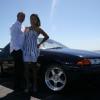Qfm Brakepads. Still Having Problems With Dust And Squeel.
Announcements
-
Latest Posts
-
well, to check fuel pressure all you need is a gauge and a 8mm joiner with a gauge port in the inlet fuel line; if it stalls at idle when hot you can open the bonnet and check pressure at that time; the fuel pump is a potential cause for what you are describing but it could also be wiring to the pump getting hot. You haven't mentioned that the factory fuel flow control on the fuel pump earth is removed. So either way, it is worth running a suitably sized and fused wire from the battery to pin 30 in a new relay in the boot. Use the ECU trigger wire into the standard fuel relay to pin 86. Earth relay pin 85 and the Fuel Pump negative (nice big wire for the latter too). Run relay pin 86 pin to Fuel Pump +. That will remove multiple possible fuel pump wiring issues in a 30+ year old car
-
I've been running a 525 for years with the standard hat and FPR in the stagea (mine has a 32 gtr fuel rail and stagea and 32 hat and tank setup are the same) without an issue with base fuel pressure. You said when you disconnected the return it is OK, did you do so at the fuel rail or the fuel hat? Either way I'd be looking for blockages or in the case of the tank kinks in the lines downstream Note I did however have an issue with the current required for the 460 melting the fuel hat.
-
I'm trying to maintain stock appearance . Hicas is still installed (although has lockout kit) did you retain factory fuel pump hat? If so I assume you used a bulkhead fitting or similar ? I was also trying to avoid a full re design as it was previously dynoed at 426kw atw with same setup but different pump. Changing return line would also mean having to change ethanol sensor and fpr and possibly fuel rail. Not chasing more power in any way just reliability of the setup
-
By Chris_Guthrie · Posted
I do think it's weird I had it for 2 weeks then the issue came up out of nowhere and progressively got worse. I would've imagined changing everything in the ignition system would've resolved any ignition related misfires but still has the high rpm and idle misfires that seem unchanged. I would've thought if it was fuel related it would happen all the time unless it's the pump losing pressure when it gets hot. If it was the ecu I would think it would do it all of the time. Something I noticed when I had it all apart was a pretty decent coating of oil in the J pipe coming from the throttle body. The weird thing about that is the pcv that goes to the intake is blocked off. So that has me wondering if the oil is coming from the turbo because that's the only thing that could get oil in there. This thing does sound like it spools like a mofo like I'm a former dsm guy and the only stock turbo I've ever heard spool this loud (to only go up to about 5psi) is on a diesel truck. And the recirculated bov is really loud too I had a TurboXS RFL and this thing is just as loud and being so low on psi seems a little weird. I don't know if any of this is or isn't related but just trying to make sure I'm not leaving any potentially helpful information out. -
By Chris_Guthrie · Posted
So latest update. I replaced the ignitor with a jspec unit from enjuku. It felt a lot better at first although it is a little bit cooler of a day than it has been. Warming up didn't have as much misfire sputtering as before. Went on a 10m test drive. Felt good, a lot stronger though I was taking it easy on the boost. On the return trip started getting the cutting out at higher rpm again and was getting worse the longer I was driving. Took it easy the rest of the way home. Before turning the car off was getting the normal idle sputtering I was getting before. So where I'm at now, entire ignition system has been replaced with upgraded components. Plugs still gapped at .8mm. Removed the fuel cap in case it was building too much reverse pressure I'm the tank, didn't help at all. Now I'm still on the same tank of gas the fuel treatment was in, I'm thinking if I can run that out and then refill with fresh 93 maybe the treatment is too concentrated in some areas but doesn't explain that it only does it once the car is warm. I'm leaning towards fuel pump or injectors but if the injector was clogging I don't think it would make it shut off like it has but then fire right back up like nothing happened. So my current guess would be the pump. Without a fuel pressure guage no way to test or check it while it's running. So that's kind of where I'm at. Need to start testing fuel components and ecu/wiring but I'm at a loss of what's the next logical step and procedure for testing it.
-



Recommended Posts
Create an account or sign in to comment
You need to be a member in order to leave a comment
Create an account
Sign up for a new account in our community. It's easy!
Register a new accountSign in
Already have an account? Sign in here.
Sign In Now